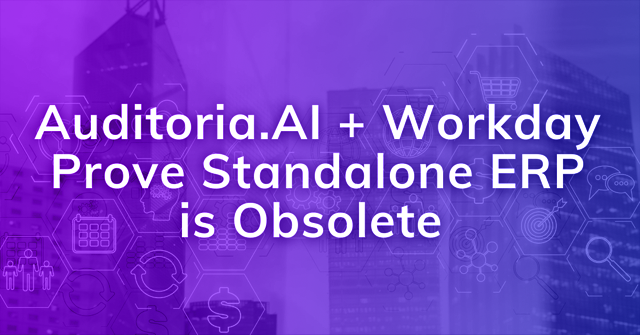Auditoria.AI + Workday Prove Standalone ERP is Obsolete

Enterprise Resource Planning (ERP) systems have come a long way since their inception, but standalone ERP solutions are becoming outdated in today’s fast-paced business environment. Coupled with the availability of an ecosystem of packaged business applications that offer more depth and proficiency, organizations must consider when and where to improve their systems of record.
As organizations strive for agility and efficiency in their back office, finance teams turn to artificial intelligence-enabled automation as a transformative solution. And most businesses are looking to get more out of their enterprise resource planning tools.
Let’s face it. We know artificial intelligence is here to stay. A Gartner report predicts that by 2024, 30% of organizations will implement and successfully utilize AI within their finance back-office solutions. In the workplace, AI is no longer a nice-to-have but a necessity.
AI in the workplace is no longer a nice to have, but a necessity. Now is the time for ERPs to embrace the availability of augmentative tech and intelligent applications to superpower their base solutions.
With automation revolutionizing how businesses manage their financial processes— from delivering real-time insights to streamlining operations and empowering finance teams to make data-driven decisions—now is the time for ERPs to embrace the availability of augmentative tech and intelligent applications to superpower their base solutions. Without these enhancements, the current limitations of many standalone ERPs will leave organizations in danger of losing ground to competitors.

The Limitations of Standalone ERP
Standalone ERP systems, while once considered groundbreaking, have amassed limitations that hinder their effectiveness in current financial operations. These include difficulty in managing complex financial processes, lack of real-time insights, a proliferation of manual data entry and reconciliation tasks, and a need for composable technology built to integrate and handle what’s next down the line.
Difficulty in managing complex financial processes
Financial processes are at the heart of every business. Still, standalone ERP solutions often need more depth and flexibility for certain finance functions, leading to cumbersome manual activities, increased risks, and reduced financial reporting and compliance accuracy.
Financial processes are at the heart of every business, but standalone ERP solutions often lack the necessary depth and flexibility for certain finance functions.
Some aspects of finance, with numbers, rows, and columns, are straightforward calculations. Other elements require situational flexibility as internal anomalies and external factors demand quick reactions and real-time decisions. This is a depth of data and analysis most humans, let alone legacy systems, cannot process alone.

Lack of real-time insights
One of the most significant limitations of standalone ERP systems is their reliance on delayed reporting and analysis. Traditional ERP solutions generate reports and provide insights based on historical data, which may be days or weeks old. In today’s fast-paced business environment, decisions must be made swiftly based on real-time information. With access to up-to-date data and real-time insights, businesses avoid making uninformed decisions and falling behind competitors who have embraced this new era of ERP.
In today's fast-paced business environment, decisions need to be made swiftly based on real-time information.
Manual data entry and reconciliation
Standalone ERP systems still require significant manual data entry and reconciliation efforts. The tedious nature of these tasks consumes valuable time and resources and introduces the risk of human error. These inaccuracies impact the overall efficiency, productivity, and trustworthiness of the ERP system.
Lack of technical agility and extensibility
Many systems of record built in years passed have to address enormous “technical debt,” a consequence of choosing a more straightforward but limited solution in the past that now requires reworking to keep up with changing requirements and the latest advancements in software tools and techniques.
From a technical perspective, it becomes immeasurably more difficult to layer new technology and advanced features on older legacy systems that were not built to handle the speed and agility required to execute in the modern era.

Moving Beyond Standalone ERP
By addressing these limitations and adopting automated ERP solutions that emphasize integration and real-time insights, finance professionals are able to dedicate their time to performing value-added functions, staying one step ahead in an ever-changing business landscape.
More agile software solutions that integrate with ERP systems allow organizations to pivot with market changes or when new innovations emerge.
Agile software solutions integrating with ERP systems allow organizations to pivot with market changes or when innovations emerge. Many advanced vendor solutions were designed with extensibility in mind, allowing new capabilities and functionality to be added. Taking advantage of an ecosystem of software vendors who deliberately built their technology to grow and adapt with leading-edge capabilities transforms organizations and their ERPs into better equipped to take advantage of new functionality and futuristic solutions.
Auditoria.AI and Workday have teamed to help lagging finance back-office teams embrace automated ERP solutions. By partnering with Workday, Auditoria enables finance teams to enhance their efficiency. At the same time, companies embrace digital transformation and automation, empowering the CFO’s office to prioritize strategic initiatives instead of error-prone manual duties.

Transform Your ERP with Workday and Auditoria AP
While the entire finance back office face challenges with the lack of automation, the accounts payable (AP) process, explicitly managing suppliers, has mainly remained stagnant. Good news for organizations looking to optimize their business processes, Auditoria, in collaboration with Workday, has developed an innovative solution to streamline supplier automation.
Auditoria and Workday revolutionize supplier management by leveraging advanced automation capabilities. These powerful tools eliminate manual data entry, reduce errors, and enhance accuracy, ultimately saving valuable time for finance teams. With seamless integration into the Workday platform, users quickly access supplier data, track invoices and manage payment processes without human intervention.
Auditoria and Workday revolutionize supplier management by leveraging advanced automation capabilities.
Auditoria’s advanced tech creates journal entries, estimates supplier accrual expenses, matches third-party data sources, and reconciles with the general ledger.
Auditoria enhances vendor serviceability, improves employee retention and morale, and allows AP teams to focus on value-added tasks by eliminating the manual processing of over 90% of monotonous emailed requests and inquiries, thereby reducing friction with vendors.

Why Auditoria and Workday
The partnership between Auditoria.AI and Workday provides a transformative solution, harnessing the power of AI automation to streamline financial processes, reduce manual tasks, and empower finance teams to focus on strategic initiatives. With the fastest deployment time in the market of 6 to 8 weeks, benchmarked by industry-leading analysts at Constellation Research, your back office will see game-changing results in days, not weeks or months.
With Auditoria and Workday, your finance team will be able to automate 75% of administrative work, recovering 1000s of hours.
Gone are the days of spending hours on administrative work and tedious finance functions. With Auditoria and Workday, your finance team will be able to automate 75% of administrative work, recovering 1000s of hours. Teams could reduce close time by 30%, improve accruals completeness and accuracy by 20%, and see value in days, not weeks or months, using automation as organizations optimize their Workday investment.
As a Workday Ventures Partner, Auditoria has access to Workday’s extensive experience, market know-how, and global reach in the enterprise space. Together, we are helping finance teams work more effectively as companies move toward digital transformation, allowing the office of the CFO to focus on strategy and business initiatives rather than on error-prone manual tasks.
Together, we are helping finance teams work more effectively as companies move toward digital transformation.
Move beyond standalone ERP and embrace the power of automation with Auditoria and Workday to unlock the true potential of your accounts payable process and drive financial excellence.
Learn more about Auditoria’s partnership with Workday here.
